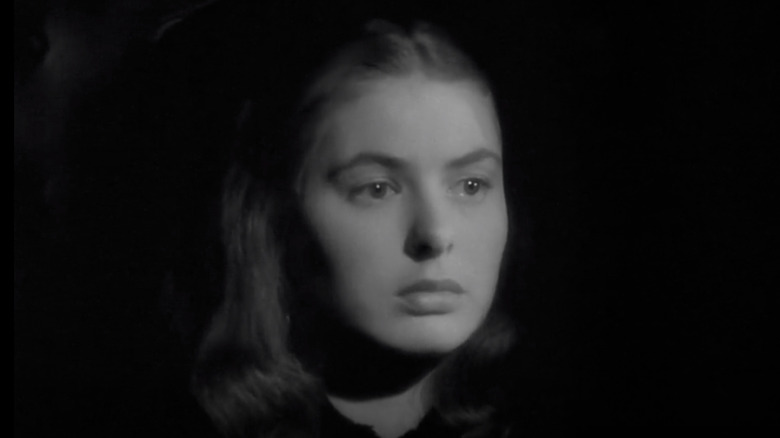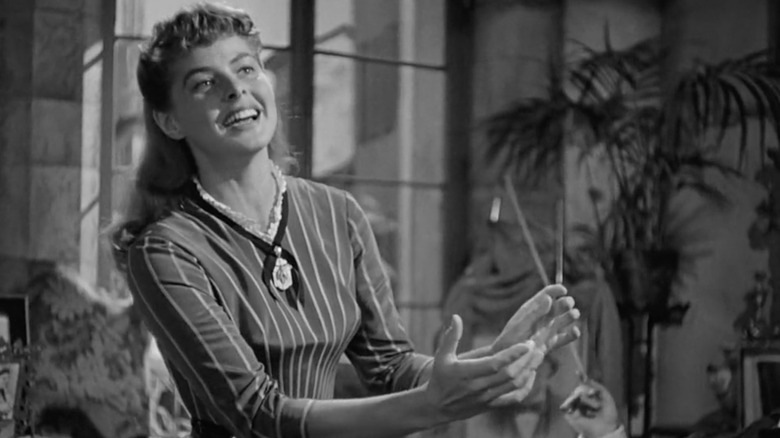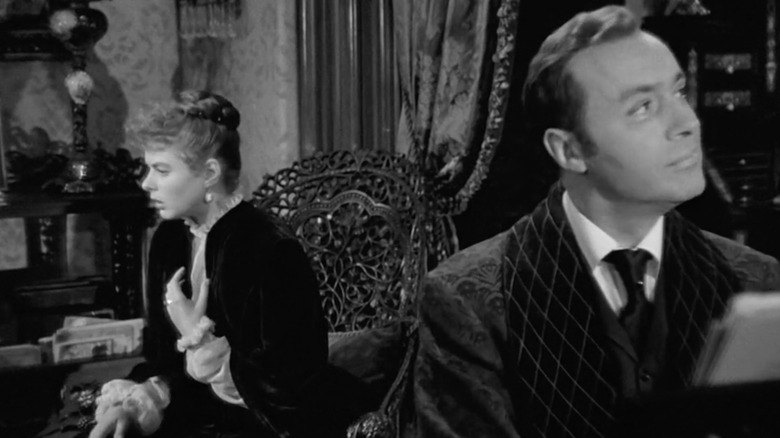Ingrid Bergman's Biggest Doubt About Gaslight Only Made It Better
"Gaslight" is the disturbing tale of a young woman who is manipulated and psychologically tortured by her greedy husband. His abuse is so thorough that, eventually, Paula (Ingrid Bergman) questions her own reality and sanity. The abuse is hard to watch, and knowing Paula's past traumas makes it even more difficult.
Prior to her marriage, Paula suffers the loss of her aunt and guardian, Alice Alquist. Alice is murdered in her home, and young Paula finds the body. After her aunt's death, she is sent to Italy, where she meets her abuser, Gregory Anton. Anton convinces her to marry him and move back into her aunt's house in London. The house is full of traumatic memories for Paula, which makes it the perfect setting for her systematic abuse.
Bergman's performance is the most important element of the film. The audience has to connect with Paula and her suffering for the movie to work, but Bergman initially wasn't sure she was right to play the timid, frightened, and vulnerable character.
Getting to know Ingrid Bergman
To understand why she hesitated to play such a meek role, you have to know a little about Bergman's past and personality.
According to Britannica, she was born in Stockholm, Sweden, in 1915. Both her parents died before she was a teenager, but she was not easily broken by tragedy and didn't allow this to derail her dreams. She attended The Royal Dramatic Theater School in her hometown for a year before she began appearing in films. Though she worked in film consistently since 1935, she wouldn't become a star until 1942, when she appeared in "Casablanca."
Bergman's classical beauty and amazing talent quickly led her to become one of the most famous actresses of Hollywood's Golden Era. Throughout her career, she was nominated for six Oscars and won three of them, but her time in the spotlight wasn't always positive.
In 1949, Bergman met and fell in love with Italian film producer/director Roberto Rossellini. They were both married to other people when they began a relationship, which only made things more complicated when Bergman became pregnant. The affair and pregnancy became headline news and led to Senator Edwin C. Johnson calling the actress "a powerful influence for evil" on the Senate floor. I guess he forgot about all the other evils taking place in 1940s America when he focused all his attention on the actress.
Luckily, Bergman was confident and secure enough to brush off the ridiculous remarks, as she recalled in an interview with Michael Parkinson years later:
"I felt it was my private life and people who judged, and wrote, and talked in the American Senate ... didn't know what they were talking about because they didn't know me, they didn't know what had happened, and the only judge that I had was my own conscience."
Although this "scandal" took place five years after she appeared in "Gaslight," the way she handled it shows the strong personality Bergman always possessed. She was not easily intimidated by powerful or controlling men. She followed her own moral compass and did not allow others' opinions to alter her self-image. With this in mind, it is easy to understand why Bergman thought she wasn't right for the role of a timid woman — because she clearly wasn't one in real life. However, this fact made her portrayal of the vulnerable Paula even more interesting.
Bergman's hang-up with playing Paula Alquist
Despite the lingering emotional scars from the loss of her murdered aunt, Paula begins the film happy and in love. A few months after her marriage, her husband, Gregory Anton (Charles Boyer), begins chipping away at her psyche. He blames her for losing things he's hidden, degrades her in front of other people, and isolates her inside their house. He slowly breaks her down emotionally and mentally. By the end of the film, a once-healthy Paula believes her memory and emotions can't be trusted.
"Gaslight" director George Cukor spoke to Charlotte Chandler for her book, "Ingrid," in which he recalled Bergman's hesitancy to play such a fragile role and why she was wrong:
"What worried Ingrid most was, can you imagine, she felt she looked too healthy! ... Personally, I thought there was no reason why a healthy girl couldn't become a terrorized victim. It seemed even more shocking."
The actress feared audiences wouldn't believe a healthy and strong woman like her could become so broken, but Cukor believed that could work to his advantage. The director wasn't interested in the further downfall of a frail character and wanted to show a strong woman losing herself to abuse and trauma, and Bergman was perfect for that role. Like Janet Leigh's unexpected murder in "Psycho," Ingrid Bergman's transformation from a beautiful, healthy, passionate woman to a mentally abused, timid one needed to be shocking, yet believable. Despite her worries, Bergman pulled it off beautifully.
The story of Paula begins with grins, stolen kisses, and the promise of a happy marriage, and ends with tears, sideways glances, and a mind she can no longer trust. Bergman's portrayal of Paula makes every moment heartbreaking and genuine, which is what makes the film so interesting to watch. Years later, Bergman remembered "Gaslight" as "one of [her] favorite films and one of the greatest experiences of [her] life."


